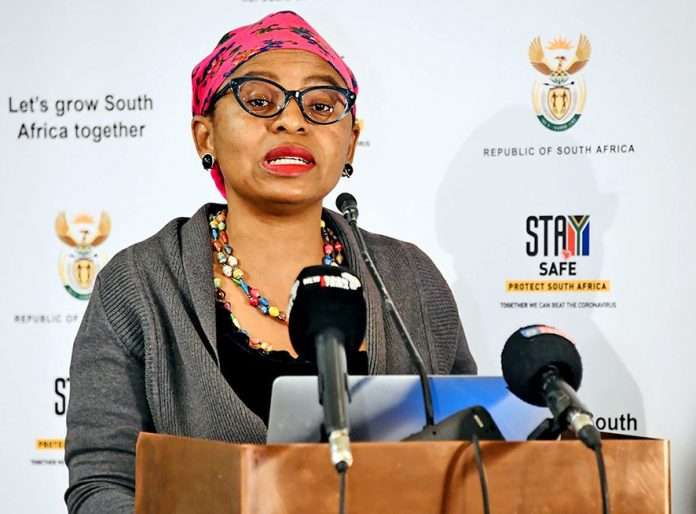Calls for the scrapping of broad-based black economic empowerment (B-BBEE) without an alternative economic transformation and empowerment policy are premature and have no basis in economic data, according to Minister in the Presidency Khumbudzo Ntshavheni.
Ntshavheni told attendees at the Black Business Council summit on Thursday in Ekurhuleni that the country witnessed the resurgence of an active and blatant pushback against transformation, spurred by an open demonstration of racism.
She said transformation policies were successfully challenged in our courts and businesses that sought to implement transformative programmes, such as Dischem in 2022, were successfully intimidated while society stood aside like non-affected parties.
“An unequal society is detrimental to the interest of all, be it government, private sector, non-governmental sector, and citizens [both black and white] as demonstrated by the events of July 2021,” she said, referring to riots that erupted in parts of Gauteng and KwaZulu-Natal.
She noted that while these policies aim to create a more representative and inclusive business landscape, their effectiveness and impact will continue to be subjects of debate.
Ntshavheni said the government would, in the future, look at other innovative policies that promote redistribution, empower marginalised communities, and foster sustainable economic development.
She added that the country’s ability to effectively navigate challenges, implement reforms, and leverage its strengths will play a vital role in shaping its economic trajectory in the coming years.
In assessing the future political economy of South Africa, she said careful consideration should be given to various factors and dynamics like inclusive growth and economic reforms, economic diversification, infrastructure development, anti-corruption and governance, social welfare and poverty alleviation, foreign trade and relations, and technological advancements.
Therefore, she said, the question of what the political economy of South Africa is and where the country is headed is basically the question of the politics behind the economy of this country.
“I can simply state that ours is the pursuit of a developmental state to achieve the objective of a better life for all as set out in our constitution.
“The interplay between politics and the economy often manifests in the form of policy decisions, trade relations, and international partnerships a country enters into,” she said.
Ntshavheni said South Africa’s path to inclusive and prosperous development depends on addressing income inequality, promoting economic transformation, managing natural resources sustainably, and fostering international partnerships.
In essence, it is how people, government, and public policy interact, or how politics affect the economy, and vice-versa how the economy affects politics.
She said the country was pursuing a development state to achieve the constitution’s objective of a better life for all and any country’s policies, trade relations, and international partnerships are all examples of how politics and the economy interact.
The minister noted that the end of apartheid in the 1990s and the resultant transformation ushered in an era of hope where political liberation became intertwined with economic aspirations.
However, she said, the legacy of apartheid still casts a long shadow over South Africa’s political economy.
“Decades of institutionalised discrimination have created vast disparities in wealth and opportunities, with the majority of the population remaining marginalised and excluded.”
Regarding income inequality, Ntshavheni said that while progress had been made, the gap between the rich and the poor remained alarmingly wide.
She said the concentration of wealth in the hands of a few exacerbated social tensions and undermined inclusive growth.
She added that the World Bank reported in 2022 that South Africa remains the most unequal country in the world, with race playing a key role in a society where 10% of the population owns more than 80% of the country’s wealth.
“Almost 30 years after the end of apartheid, race remains a key factor in South Africa’s inequality due to its impact on education and the labour market,” said Ntshavheni.
A recently published survey, she commented, reported that top management in the private sector still shows disproportionate representation, with white people occupying 62.9% of all positions.
“Addressing the imbalances has been at the forefront of South Africa’s political economy. A critical aspect of it is, thus, the pursuit of economic transformation and empowerment.
“B-BBEE initiatives were introduced to redress the imbalances of the past, ensuring increased participation of historically disadvantaged individuals in the economy.”
Ntshavheni further explained that education or access to it also contributed to the deepening inequality in South Africa – with a 30% influence on the inequality gap.
However, she added, education also holds the key to addressing disparities in society by providing equal opportunities for all.
“Investing in quality education, particularly in historically disadvantaged communities, equips individuals with the knowledge and skills needed to participate meaningfully in the economy, reducing income inequality and promoting social mobility.”
She also said that South Africa’s rich natural resources, including minerals, play a pivotal role in its economic landscape.
However, the reliance on finite resources poses challenges such as environmental degradation, resource depletion, and vulnerability to global commodity price fluctuations.
“Diversification and sustainable resource management are key considerations for South Africa’s future economic resilience,” she said.
The minister highlighted that the nation’s capacity to facilitate domestic investments and draw foreign direct investments had an impact on its ability to diversify its economy.
“Therefore, South Africa’s political stability, sound governance, and commitment to the rule of law are crucial to attracting foreign investment and fostering economic growth.”
Follow @SundayWorldZA on Twitter and @sundayworldza on Instagram, or like our Facebook Page, Sunday World, by clicking here for the latest breaking news in South Africa.



